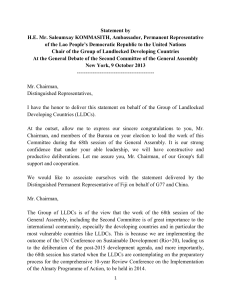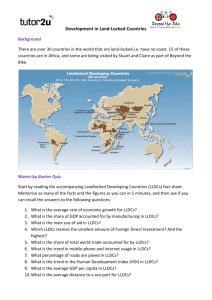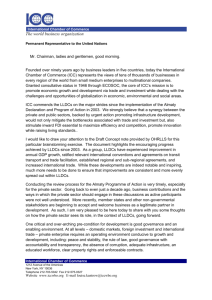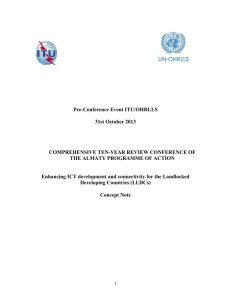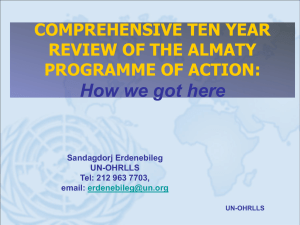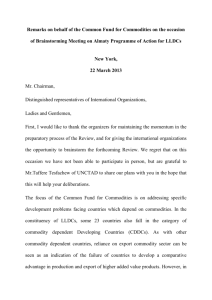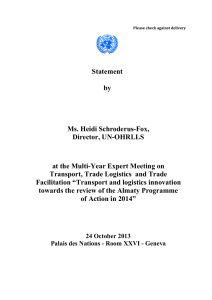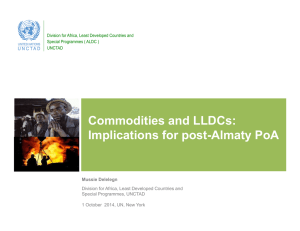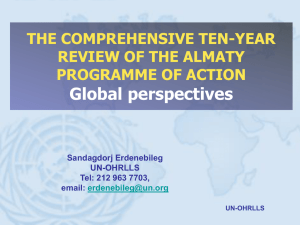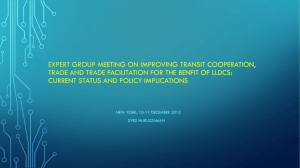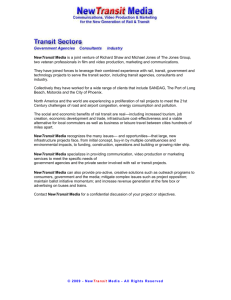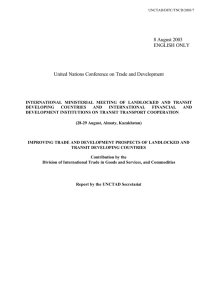A-GA1-02-01
advertisement
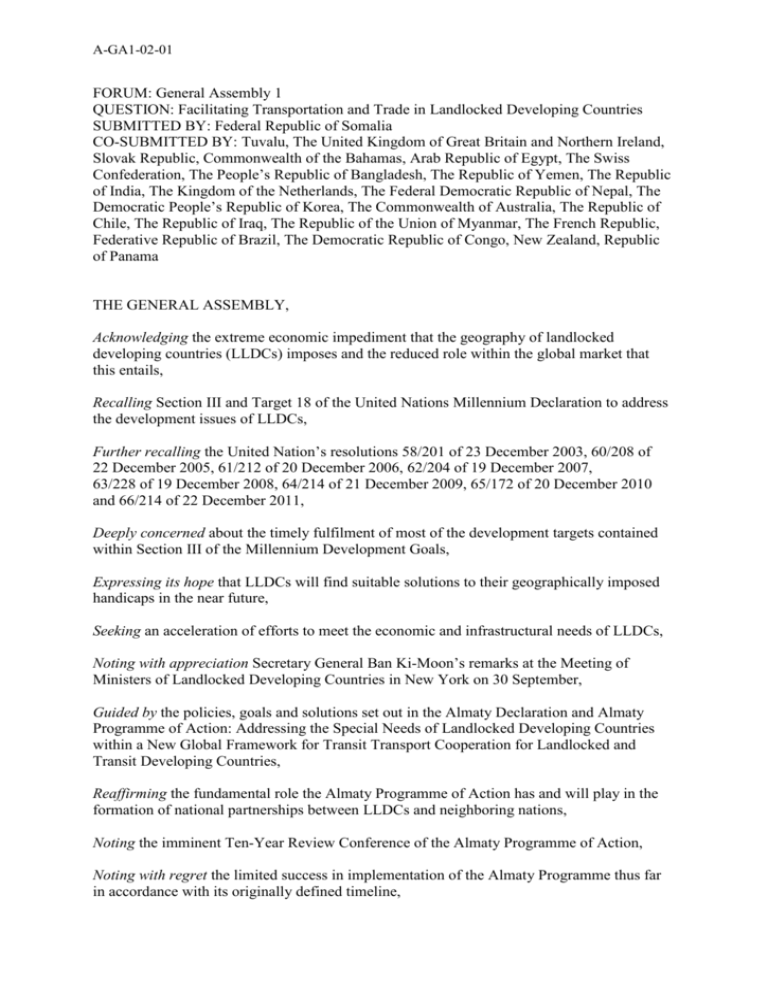
A-GA1-02-01 FORUM: General Assembly 1 QUESTION: Facilitating Transportation and Trade in Landlocked Developing Countries SUBMITTED BY: Federal Republic of Somalia CO-SUBMITTED BY: Tuvalu, The United Kingdom of Great Britain and Northern Ireland, Slovak Republic, Commonwealth of the Bahamas, Arab Republic of Egypt, The Swiss Confederation, The People’s Republic of Bangladesh, The Republic of Yemen, The Republic of India, The Kingdom of the Netherlands, The Federal Democratic Republic of Nepal, The Democratic People’s Republic of Korea, The Commonwealth of Australia, The Republic of Chile, The Republic of Iraq, The Republic of the Union of Myanmar, The French Republic, Federative Republic of Brazil, The Democratic Republic of Congo, New Zealand, Republic of Panama THE GENERAL ASSEMBLY, Acknowledging the extreme economic impediment that the geography of landlocked developing countries (LLDCs) imposes and the reduced role within the global market that this entails, Recalling Section III and Target 18 of the United Nations Millennium Declaration to address the development issues of LLDCs, Further recalling the United Nation’s resolutions 58/201 of 23 December 2003, 60/208 of 22 December 2005, 61/212 of 20 December 2006, 62/204 of 19 December 2007, 63/228 of 19 December 2008, 64/214 of 21 December 2009, 65/172 of 20 December 2010 and 66/214 of 22 December 2011, Deeply concerned about the timely fulfilment of most of the development targets contained within Section III of the Millennium Development Goals, Expressing its hope that LLDCs will find suitable solutions to their geographically imposed handicaps in the near future, Seeking an acceleration of efforts to meet the economic and infrastructural needs of LLDCs, Noting with appreciation Secretary General Ban Ki-Moon’s remarks at the Meeting of Ministers of Landlocked Developing Countries in New York on 30 September, Guided by the policies, goals and solutions set out in the Almaty Declaration and Almaty Programme of Action: Addressing the Special Needs of Landlocked Developing Countries within a New Global Framework for Transit Transport Cooperation for Landlocked and Transit Developing Countries, Reaffirming the fundamental role the Almaty Programme of Action has and will play in the formation of national partnerships between LLDCs and neighboring nations, Noting the imminent Ten-Year Review Conference of the Almaty Programme of Action, Noting with regret the limited success in implementation of the Almaty Programme thus far in accordance with its originally defined timeline, A-GA1-02-01 Noting further that the conception and negotiation of specific solutions to the economic issues that LLDCs face is the responsibility of LLDCs themselves and their neighboring transit countries, Desiring greater levels of commitment by nations to aiding implementation of permanent solutions for the development of LLDCs, Welcoming specific pledges of countries to facilitate greater levels of trade with LLDCs and encourage economic development, Taking into account the possibility of implied economic stresses exerted upon nations contributing to the development of LLDCs and the resulting prospect of required solutions to such stresses in the present and future, Emphasizing the importance of the conception of contextually circumstantiated trade agreements between LLDCs transit countries designed to provide specialized benefits to the landlocked parties without negatively impacting the economic, political or societal integrity of transit countries, Affirming the right of all transit countries to full sovereignty, and thus their right to institute any measures necessary to protect their respective interests in the implementation of solutions designed for their neighboring LLDCs, 1. Calls upon both the public and private international sectors to invest in LLDCs as long-term ventures through actions such as but not limited to: a. heightened levels of consideration granted to investment opportunities within LLDCs, b. shifts in investment focus from traditional markets outside of such countries to new ones within them, c. investments in the modernization of their agricultural and industrial sectors; 2. Trusts that LLDCs and transit nations possess the necessary diplomatic ability to negotiate effective trade agreements without significant mediation from international or United Nations sources through the conduction of interactions including: a. realistic negotiation terms, b. objective assessments of issues being discussed, c. objectively fair settlements; 3. Encourages transit countries to assist neighboring LLDCs in their attempts to develop their economies and achieve fair economic representation upon the world stage by: a. negotiating mutually beneficial trade agreements including: i. agreements dictating trade on the regional and local level, ii. guidelines on the passage of goods constituting international trade by the landlocked party through transit countries, iii. stipulations on the extent of control transit countries bear over the passage of trade articles through their borders as initiated by their landlocked neighbors, iv. economic and/or political incentives for transit countries to commit to their landlocked neighboring countries, A-GA1-02-01 v. cost-effective solutions to the economic impediments LLDCs face, b. building dedicated or partially shared transportation infrastructure for geographically adjacent LLDCs with the conditions of: i. sufficient capacity to efficiently serve the needs of sustained growth in trade volume, ii. adequate quality of construction and maintenance to ensure efficient usability, iii. adequate policing as determined by the terms of the agreement comprising the management of the infrastructure, c. offering subsidies to private shipping companies bearing contracts with private or national entities stemming from LLDCs; 4. Recommends the close adherence of LLDCs and transit countries to the Almaty Programme of Action in developing partnerships designed to alleviate the economic needs of LLDCs in order to enforce a standard of comprehensive efficiency and rigor; 5. Calls for the creation of a committee under the General Assembly dedicated to monitoring the relationships and interactions of LLDCs and partnering transit nations with the goals of: a. providing a source of external judgment in the settlement of disputes through one of the following measures: i. the presence and active participation of a committee representative in interactions between the countries, ii. the requirement of LLDCs and their respective partnered transit countries to provide individual and regular reports on their interactions pertaining to trade in some manner with one another and subsequently issuing appropriate responses according to the reports provided, b. ensuring the fair fulfilment of each party’s respective responsibilities as per their negotiated agreements with one another by: i. cooperating with the World Bank to perform quadrennial audits targeting international trade generally within LLDCs and government agencies associated with international trade within transit countries for the first 12 years of partnerships between such countries, ii. encouraging honest and comprehensive communication with the committee, c. confirming legitimacy through greater levels of short-term monitoring following the initiation of trade agreements including: i. two years of precise market monitoring comparing economic indicator measurements prior to the agreement to those following it, ii. four years of economic analysis assessing the cost-benefit relationships existent as a result of the agreement and thereby the health of the agreement’s current terms, d. giving accurate advice on the sustainment of trade agreements and the expansion of infrastructure networks if required; 6. Endorses the operations of trade expansion-focused non-governmental organizations (NGOs) within LLDCs by promoting the respective causes of such NGOs through the marketing channels of the UN; 7. Invites developed nations to provide large-scale economic incentives to the parties responsible for building the transit infrastructure within transit nations and initiate A-GA1-02-01 trade-conducive policies targeting both LLDCs and their trade-facilitative transit country partners; 8. Draws the attention of the international community to LLDCs as the most effective frontier upon which to advance the cause of the eradication of poverty through actions such as but not limited to: a. the application of economic stimuli designed to uplift the lower class, b. the donation of financial resources to aid institutions targeting such countries, c. the investment in primary industry and secondary industry, d. the support of efforts to construct infrastructure facilitating access to sea-borne transit.
